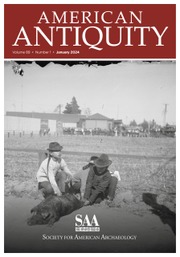Article contents
Spatiotemporal Variation in ΔR on the West Coast of North America in the Late Holocene: Implications for Dating the Shells of Marine Mollusks
Published online by Cambridge University Press: 12 August 2020
Abstract
Radiocarbon ages on mollusk shells, which account for about half of the more than 8,000 dates from cultural deposits on the west coast of North America, need to be corrected for the local marine reservoir effect (ΔR) to yield true ages. Assays on “prebomb” shells show that ΔR increases poleward, echoing the age gradient in offshore waters. The meridional gradient in ΔR is not appreciably affected by the transition either from an upwelling regime to a downwelling regime north of 40°N–45°N or from a winter maximum-high alkalinity river discharge pattern to a summer maximum-low alkalinity pattern at the same latitude, probably because these changes are offset by increasing storminess and tidal energy in coastal areas. Mesoscale variations in ΔR along this gradient are attributable to contrasts in shore morphology and exposure. Data from 123 shell-wood pairs reveal similar patterns of temporal variation in ΔR in the late Holocene in the coastal ecoregions. The characteristic temporal pattern echoes phases of variable El Niño-Southern Oscillation (ENSO) activity. The high degree of variability in ΔR argues against the indiscriminate application of regionally uniform or trans-Holocene ΔR values and demands improvements in spatiotemporal resolution if shell is used to date cultural deposits.
Las edades radiocarbónicas de conchas de moluscos, que representan aproximadamente la mitad de las más de 8.000 edades de depósitos culturales en la costa oeste de América del Norte, deben corregirse en función del efecto reservorio marino local (ΔR) para producir edades reales. Estimados de ΔR de 75 "pre-bomba" conchas de moluscos de sitios costeros que se alimentan por filtración hacen eco del gradiente de edad en zonas abisales. El gradiente no está influenciado por la transición de un régimen de surgencia (upwelling) (al sur de 40°N-45°N) a un régimen de surgencia negativa (downwelling), y una transición a la misma latitud desde un patrón de descarga de ríos de máxima / alta alcalinidad invernal a una alcalinidad máxima / baja veraniega. Las variaciones de mesoescala superpuestas a este gradiente general son atribuibles a la morfología costera, la frecuencia de tempestades, el rango de las mareas y los contrastes estuarios vs costas abiertas. Las fluctuaciones a escala de siglos en el ΔR durante el Holoceno tardío (de 123 pares concha-madera) se hacen eco de la frecuencia relativa de eventos de El Niño moderados a muy fuertes en la costa oeste de América del Sur. El alto grado de variabilidad espacio-temporal en ΔR, particularmente en las áreas bajo la influencia de la corriente de California, desaconseja la aplicación de correcciones uniformes, trans-Holoceno, regionales de la edad de conchas, y exige mejoras en la resolución espacio-temporal si se usa las conchas para fechar los depósitos culturales.
Keywords
- Type
- Articles
- Information
- Copyright
- Copyright © 2020 by the Society for American Archaeology
References
References Cited
- 9
- Cited by


